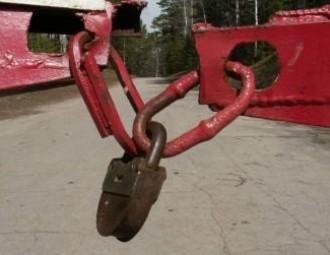Mikalaj Ulasevich: I appealed against the ban to entry Lithuania

The coordinator of the public campaign “Building NPP in Astravets is a crime!” who was banned to entry Lithuania, Mikalaj Ulasevich appealed against this judgement in the Vilnius City Court.
To be more precise, it was the Lithuanian lawyer who did it, as the activist himself still cannot entry Lithuania. As he explained to the EuroBelarus Information Service, a decision related to him was that he is banned to entry Lithuania from September, 25 up to December, 10, 2012: “Just in Lithuania. My Schengen visa remains with me, I can go, for instance, to Poland”.
Belarusan ecological activists Mikalaj Ulasevich and Tatsiana Novikava were going to Lithuania on the 26th of September to take part in the conference “Lithuania – Belarus: nuclear neighbourhood”. But they were not allowed to enter Lithuania. “A restricting statement was accepted by the Lithuanian Foreign Office right the day before – on the 25th of September. The motivation was not announced, I think it could be clarified in court, if it will be clarified, of course, - said Ulasevich. – But this ban was taken not only against me and Tatsiana. It is only that two of us have appealed against it. The decision was taken against a large group of antinuclear activists. They spoilt visas to our colleagues from Astravec , and to the activists of the antinuclear movement from Kaliningrad as well. It was made in relation to the referendum on the nuclear power plant building that was taking place in Lithuania, and Lithuanian authorities did not want us to come there and to blow out the antinuclear tide”.
Ulasevich’s lawyer filed a complaint to the administrative court of Vilnius, but Mikalaj still doesn’t know how the things are going there and doesn’t know the date when the case will be examined: “I think it will happen without our involvement. Though perhaps the lawyer will make them admit us to the court, I am still not certain”.
Mikalaj Ulasevich is going to change his passport so that to get rid of the stain on his visa, but is still concerned that it won’t help if he is logged into the base of persona non grata: “If we are removed from this base after the 10th of December – this is good. And what if we are not? I was getting my Schengen visa right in the Lithuanian embassy, so, next time I will be turned down there and they will recollect me this failed entry? On the whole, we made a decision to appeal against our non-admission to Lithuania”.
Meanwhile the delegates of the European Parliament Rebecca Harms and Werner Schultz stood up for the Belarusan antinuclear activists. They addressed an open letter to the Lithuanian Minister of the foreign affairs A. Ažubalis and to the ambassador of Lithuania under EU R. Karoblis in which they call upon the Lithuanian authorities to provide an explanation of the decision about the ban on the entry taken by them, as well as reconsider their decision and to remove the ban.
Mikalaj Ulasevich knows that the Belarusan antinuclear movement activists’ non-admission to Lithuania case drew a wide response in Europe, but he says that he is not going to go anywhere now, “there is simply no necessity in leaving Belarus so far”.
On the question about the further actions within the scope of the “Building NPP in Astravets is a crime!” campaign Mikalaj Ulasevich found difficulty in replying. He noted that during the summer the process of nuclear power plant building was going on quite intensively, but in today’s winter conditions it will, perhaps, slow down in a way.
-
03.01
-
07.10
-
22.09
-
17.08
-
12.08
-
30.09



























